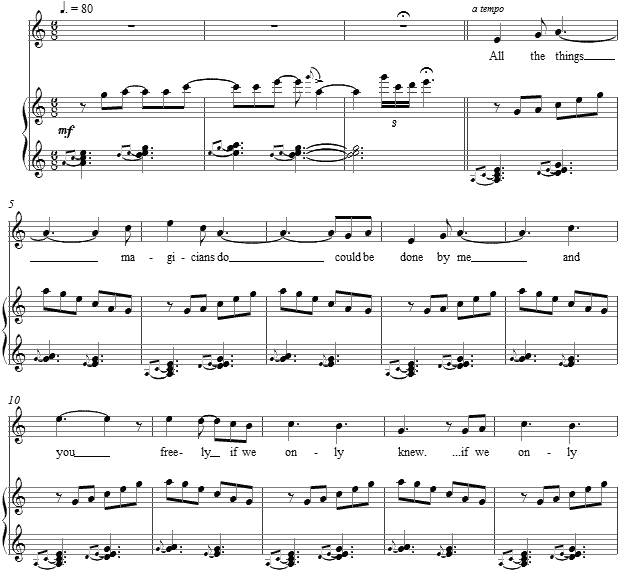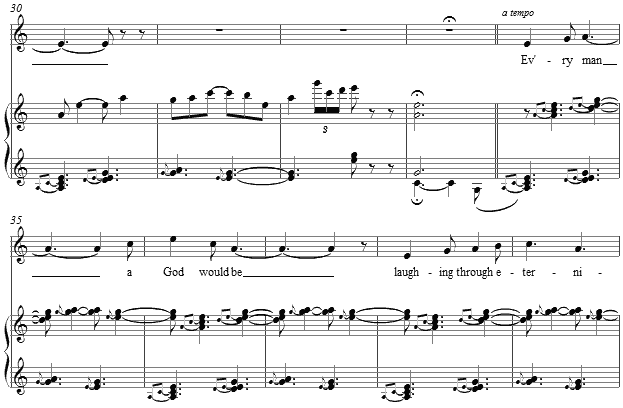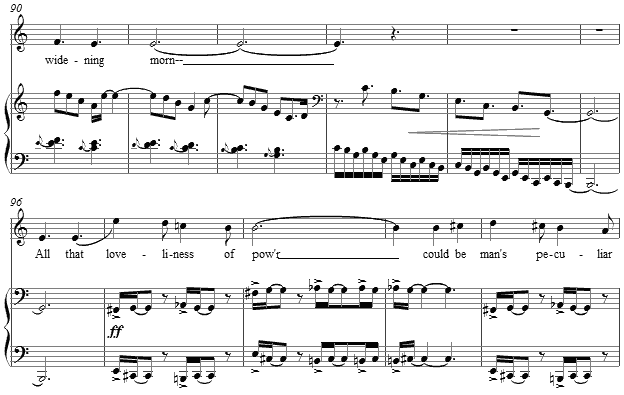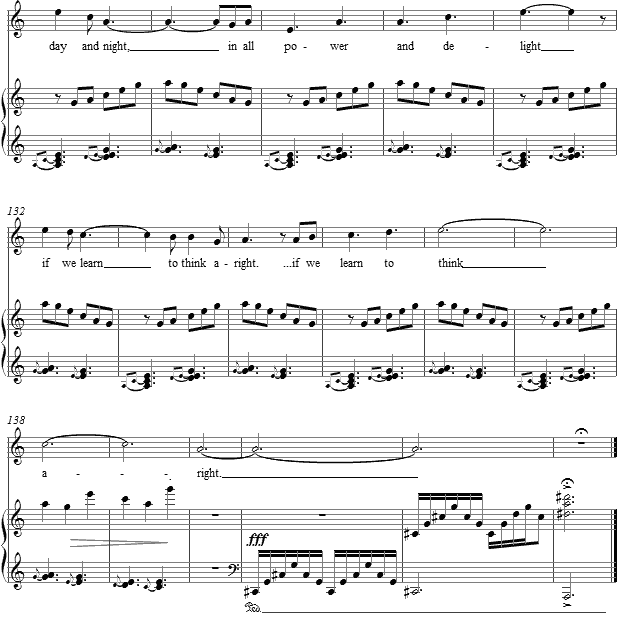Music and Texts of GARY BACHLUND
Vocal Music | Piano | Organ | Chamber Music | Orchestral | Articles and Commentary | Poems and Stories | Miscellany | FAQs
Hymn - (2008)
C. S. Lewis
for medium voice and piano
All the things magicians do
Could be done by me and you
Freely, if we only knew.
Human children every day
Could play at games the faeries play
If they were but shown the way.
Every man a God would be
Laughing through eternity
If as God's his eyes could see.
All the wizardries of God-
Slaying matter with a nod,
Charming spirits with his rod,
With the singing of his voice
Making lonely lands rejoice,
Leaving us no will nor choice,
Drawing headlong me and you
As the piping Orpheus drew
Man and beast the mountains through,
By the sweetness of his horn
Calling us from lands forlorn
Nearer to the widening morn-
All that loveliness of power
Could be man's peculiar dower,
Even mine, this very hour;
We should reach the Hidden Land
And grow immortal out of hand,
If we could but understand!
We could revel day and night
In all power and all delight
If we learn to think aright.[ 7 pages, circa 3' 45" ]
C. S. Lewis
Clive Staples Lewis (1898-1963), better known as C. S. Lewis, was a medievalist, Christian apologist, literary critic, academic, radio broadcaster, and essayist. He is best known for his fiction, especially The Screwtape Letters (1942), The Chronicles of Narnia (1950-1956) and, my favorite, The Space Trilogy consisting of Out of the Silent Planet (1938), Perelandra (1943), and That Hideous Strength (1945), as well as the recommended and instructive The Abolition of Man (1943).
Spirits in Bondage, subtitled A Cycle of Lyrics, was C. S. Lewis' youthful book of poetry, published in 1919 by Heinemann under Lewis' pseudonym, Clive Hamilton. The poems were written between 1915-18, during which Lewis was a military trainee at Oxford, and then served in the trenches of World War I. The poem varies in subject from nature's beauty to cynical views about the presence of evil in the world. A modern scholar has noted that "death by government" in the twentieth century amounted to 169 million people per his study. [ 1 ] Certainly, the wish for absolute power as Lewis so well describes in this text has been a common and ultimately savage longing among men. As has been observed and often restated, "Power tends to corrupt, and absolute power corrupts absolutely. Great men are almost always bad men." [ 2 ]
This Hymn, the thirty-first poem in his anthology, is about that evil which seeks equality with the power of God, and Lewis as Hamilton notes in a subtitle, it was suitable "For Boys' Voices." In some ways this echoes Fielding's The Lord of the Flies, also ostensibly about boys. [ 3 ] While I chose not to set if for boys, per se, the range of the setting is moderate and could by sung unison by trebles. The setting begins innocently, as if a song for children with its mention of magicians and faeries.
A subtle change in the text drops allusions to the faeries and magicians and clearly focuses on the real covetousness of man -- God's power. For this, one notes Lewis has capitalized "God" -- for it is not the power of "gods" after which so many governments and their dictators have lusted, but rather after the supreme power of God. The setting begins to become slightly more complex, yet remains consonant and sing song.
As the poem admits to the "loveliness of power," the accompaniment becomes aggressive. more dissonant and jarring. This progresses until the accompaniment is made wholly of augmented fourths -- the diabolus in music -- and reaches it greatest crescendo.
The ending reprises the gentler opening, as if the setting like the text itself had admitted a little to clearly of a brazen lust for absolute power, and needed to back track rhetorically. Even so, the final gesture in the piano reminds us of the real purpose of this wish by its gesture made up again wholly of tritones.
The score for Hymn is available as a free PDF download, though any major commercial performance or recording of the work is prohibited without prior arrangement with the composer. Click on the graphic below for this piano-vocal score.
NOTES
[ 1 ] Death by Government by R. J. Rummel (New Brunswick, N.J.: Transaction Publishers, 1994) 496 pages. While today's politics is filled with the political Left pretending towards an anti-war stance and incorrectly identifying the National Socialism of Germany before and during World War II as "right wing," the simple fact as bolstered by the scholarship of Professor Rummel is that the list of totalitarian governments might be best defined consistently as organized on some form of socialism, in which the astounding numbers of victims of government boggle the mind.
A University of Hawaii political science professor, Rummel writes in his Preface, "This book is part of a project on government genocide and mass killing in this century. The aim is to test the hypothesis that the citizens of democracies are the least likely to be murdered by their own governments; the citizens of totalitarian, especially Marxist systems, the most likely. The theory is that democratic systems provide a path to peace, and universalizing them would eliminate war and minimize global, political violence."
Rummel notes, among the total, almost 62 million victims of the Soviet Gulag state, 35 million victims of Communist China (especially Mao's famine, 1958-1962), 21 million victims of the Nazi State (National Socialism, which is the party name that became abbreviated to Nazi), 5 million victims of Imperial Japan, 2 million victims of Cambodia's Khmer Rouge, almost 2 million victims of Turkey's genocidal purges, and many more instances, all redounding to the actions of governments. Or as Rummel's title so clearly states, Death by Government.
Other titles by Professor Rummel include Lethal Politics: Soviet Genocide and Mass Murder since 1917 (1990), Democide: Nazi Genocide and Mass Murder (1991), and China's Bloody Century: Genocide and Mass Murder since 1900 (1991). There is, therefore enormous reason to be suspicious of and remain vigilant against growing government power, for a reasonably history of the twentieth century shows that government itself is the greatest cause of death.
[ 2 ] This is a now famous quotation by John Emerich Edward Dalberg Acton, first Baron Acton (1834–1902). The British historian and moralist, known simply as Lord Acton, expressed this opinion in a letter to Bishop Mandell Creighton in 1887. Thus it is often noted that a person’s sense of morality lessens as his or her power increases, thereby leading governments, as above, toward their many genocides. Today's political dialogues tend to overlook these truths, over even to demean and obscure them all in the service of the acquisition of governmental power.
[ 3 ] The Judeo-Christian tradition speaks to the notion of "foolish" and "childish" things, and the lust for power equivalent to God's might well be said to be "childish." Lamentations 2:14 reads, "Thy prophets have seen vain and foolish things," while 1 Corinthians 1:27 reads, "But God hath chosen the foolish things of the world to confound the wise; and God hath chosen the weak things of the world to confound the things which are mighty" and later 1 Corinthians 13:11 says, "When I was a child, I spoke as a child, I understood as a child, I thought as a child: but when I became a man, I put away childish things." The notion of foolish, childish pursuits is a theme throughout the history of man, as men and women acting with the foolish willfulness of children sought to exercise power which proved in the end only to have been an exercise in evil, per the wise reporting by Professor Rummel, as above.




